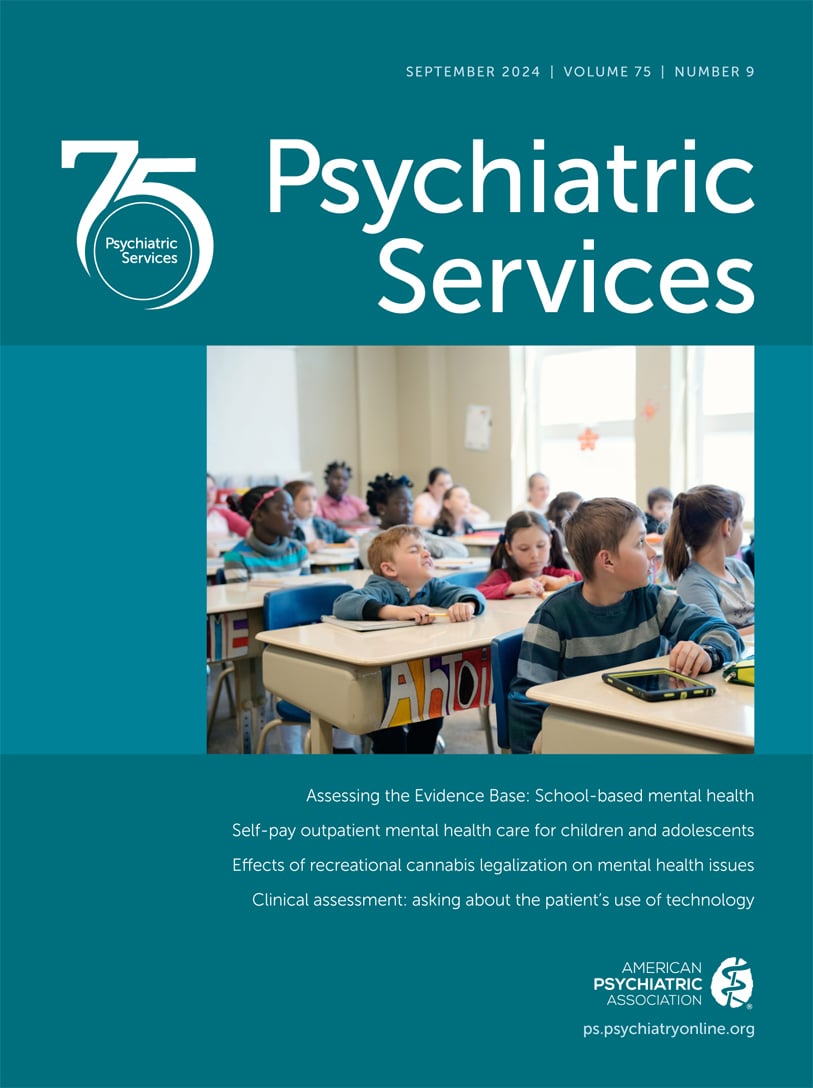Psychiatric Services
- Volume 69
- Number 11
- November 2018
Taking Issue
Articles
Publication date: 28 August 2018
Pages1138–1145Objective: This study examined racial and ethnic differences in treatment outcomes among participants in a randomized controlled trial of an intervention for first-episode psychosis called NAVIGATE. Methods: Secondary data analyses were conducted for ...
https://doi.org/10.1176/appi.ps.201800067Publication date: 28 August 2018
Pages1146–1152Objective: Multiple studies have detailed the relationship between Medicaid expansion under the Affordable Care Act and various health and financial outcomes. However, fewer studies have examined Medicaid expansion’s effects on individuals with psychiatric ...
https://doi.org/10.1176/appi.ps.201800181Publication date: 17 September 2018
Pages1153–1159Objective: The study examined psychosis literacy among Latinos with first-episode psychosis (FEP) and their caregivers. The authors tested a model that knowledge of psychosis and attribution of illness to psychosis predicted professional help seeking in a ...
https://doi.org/10.1176/appi.ps.201700400Publication date: 28 August 2018
Pages1160–1166Objective: The study compared Medicaid cost-effectiveness for children with serious emotional disturbance receiving services from two programs operated by the New York State Office of Mental Health: the Home and Community-Based Services (HCBS) Waiver ...
https://doi.org/10.1176/appi.ps.201700537Publication date: 17 September 2018
Pages1167–1174Objective: Care management entity models have a positive impact on functioning and symptom control among youths with serious emotional and behavioral disorders. However, little is known about whether treatment benefits are sustained after discharge. The ...
https://doi.org/10.1176/appi.ps.201600539Publication date: 26 September 2018
Pages1175–1180Objective: The authors sought to determine whether a multicomponent, community-based program for preventing maternal depression also promotes engagement with mental health services for individuals with persistent symptoms. Methods: Mothers of children ...
https://doi.org/10.1176/appi.ps.201800173Open Forum
Publication date: 06 September 2018
Pages1181–1183Many people are interested in using marijuana for therapeutic purposes as legalization expands across the country. The impact of marijuana depends upon the consumed potency and dose of its major psychoactive components, tetrahydrocannabinol and ...
https://doi.org/10.1176/appi.ps.201800210Personal Accounts
State Mental Health Policy
Publication date: 06 September 2018
Pages1124–1126Sequential intercept mapping, a community-based application of the sequential intercept model, was recently adapted in Ohio to address the complex challenge of the opioid crisis. Sequential intercept mapping for opioids provides a framework for criminal ...
https://doi.org/10.1176/appi.ps.201800192Research, Community, & Services Partnerships
Publication date: 09 August 2018
Pages1127–1130Stakeholder engagement is an important component of pragmatic trials seeking to improve mental health care in real-world settings. Models of stakeholder engagement outline the benefits of involving a diverse array of partners in all phases of research. ...
https://doi.org/10.1176/appi.ps.201800057Economic Grand Rounds
Publication date: 28 August 2018
Pages1131–1134Accountable care organizations (ACOs) can potentially improve value in behavioral health care. However, little is known about the likelihood of ACO participation among hospitals with behavioral health services. The authors explore statistical predictors ...
https://doi.org/10.1176/appi.ps.201800248Culture & Mental Health Services
Publication date: 25 July 2018
Pages1135–1137Professional organizations and government guidelines recommend cultural competence training for providers, but the lack of a standardized cultural assessment has hindered research. Studies with the DSM-5 Cultural Formulation Interview (CFI) suggest that ...
https://doi.org/10.1176/appi.ps.201800119Brief Reports
Publication date: 28 August 2018
Pages1184–1187Objective: The study compared clinical outcomes of depression treatment in primary care with a colocation model versus a collaborative care model (CoCM). Methods: Patients (N=240) with Patient Health Questionnaire-9 (PHQ-9) scores of ≥10 treated for ...
https://doi.org/10.1176/appi.ps.201700569Publication date: 17 September 2018
Pages1188–1190Objective: Despite possible cure rates of >90% with new treatment, people with serious mental illness are rarely screened for hepatitis C virus (HCV). A colocated approach may help patients navigate the care continuum. Methods: This study used a mixed-...
https://doi.org/10.1176/appi.ps.201700542Publication date: 05 October 2018
Pages1191–1194Objective: This study examined ethnic-racial differences in referral source, length of stay, legal status, and diagnosis in state-operated substance abuse inpatient treatment in Connecticut. Methods: Data from 2004–2005 (N=1,484) and from 2010–2011 (N=4,529) ...
https://doi.org/10.1176/appi.ps.201600003Past Issues
View Issues Archive
Vol. 75 | No. 12

Vol. 75 | No. 11

Vol. 75 | No. 10
